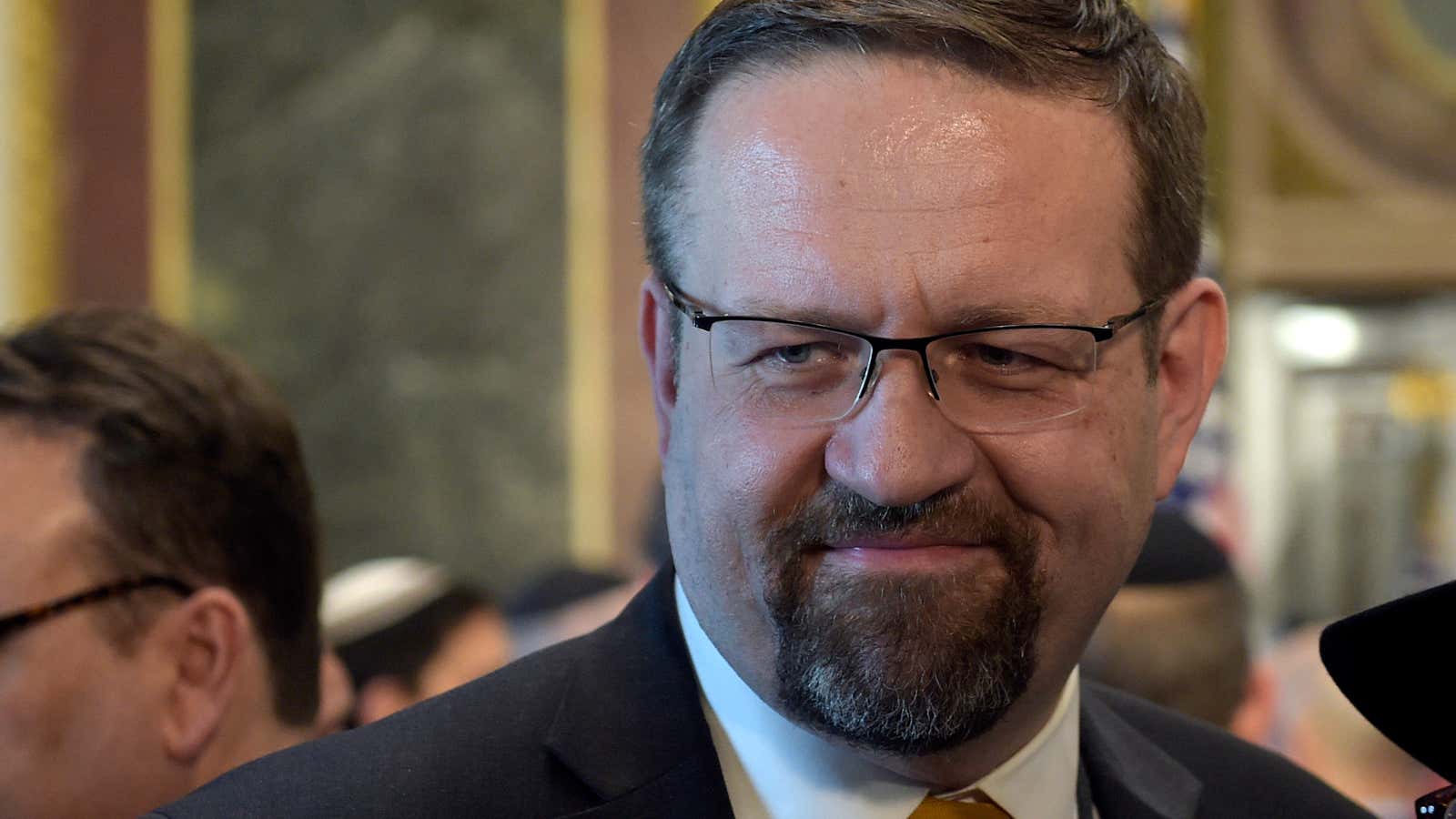With Donald Trump reaching the 100-day mark of his presidency, his tenure thus far can be separated into two distinct chunks. At the beginning, the White House seemed energized yet consumed by chaos. Courts blocked Trump’s executive orders. The president’s claims that former US president Barack Obama had wire-tapped then-candidate Trump fell flat. The president even insulted the Australian prime minister.
Over the past few weeks, however, Trump has achieved something approaching relative—if unproductive—stability. Hearings on his campaign’s ties to Russia have stalled, while the remarkable resignations that characterized his first weeks seemed to have slowed. Something of an “Axis of Adults” appears to be rising, while the sun may be setting on Steve Bannon, the ur-nationalist who may have already flown too close to the political sun.
But the continued presence of one nationalist figure, with retrograde views on everything from Islam to the First Amendment, is a reminder that the fringe is still never too far from Trump. Deputy assistant to the president Sebastian Gorka pushed into the executive branch in January. As reports swirl about a potential exit by the Hungarian nationalist, it’s worth taking a moment to reflect on how a man with his perspective on the world has been allowed to remain so close to the Oval Office.
Before his US career, Gorka honed his political attitudes in Europe. Born in the UK to Hungarian parents, Gorka worked his way into post-communist politics in Budapest. Hungarian media have described him as an adviser to prime minister Viktor Orbán—one of Europe’s foremost illiberal heads of state—but the relationship between the two eventually cooled, with Gorka subsequently tacking toward former members of Hungary’s hard-right Jobbik party. Along the way Gorka picked up a PhD, putting together a doctoral dissertation on “radical Islam” that, as recent American academics have discovered, is as far-fetched as it is farcical.
Over the past few years, Gorka—who also refers to himself, in all seriousness, as an “alpha male”—has fully embraced the Bannonite nationalism that also caught Trump’s eye. For example, Gorka recently Tweeted that the phrase “radical Islamic terrorism” is, somehow, “key to Victory against Global Jihadism.” (Gorka doesn’t speak Arabic, and has never lived in a Muslim-majority country.) Unsurprisingly, Gorka signed on with Breitbart as a national security editor, a position he only left to join the Trump administration.
As he made a name for himself commenting on violent extremism—read: Islamism—Gorka also accumulated a wide range of critics. It’s not every day that a New York Times headline describes someone as an “Islamophobic Huckster.” Many of Gorka’s critics were especially critical of his recent proposal to partition Libya into three distinct chunks—an idea he pushed via napkin.
But Gorka’s napkin-based proposals are not the most concerning aspect of his backstory. Several non-mainstream publications, such as Forward and Lobelog, have focused on Gorka’s relationship with Vitezi Rend, a far-right Hungarian nationalist organization. Founded in 1920 by the proudly anti-Semitic Miklos Horthy, the group, as NBC found, was placed on the US State Department’s list of organizations which at one time were “under the direction of the Nazi government of Germany.”
Gorka’s relationship with the group came to public attention during Trump’s inaugural ball, when he sported an honorary medal from Vitezi Rend. While Gorka claimed he wore the medal in honor of his father, himself a former member of Vitezi Rend, Forward has reported that Gorka fils is, in reality, a sworn member of the organization. Numerous prominent individuals of the Hungarian town where Gorka unsuccessfully ran for mayor a decade ago claim he was part of the group—voices that include even Gorka’s political allies. As a member of Gorka’s ticket told NBC, “I knew that Sebastian Gorka was a member of Vitezi Rend, even then.”
(Gorka’s denials have been less than forceful—and Vitezi Rend’s representatives announced they were “really proud” seeing Gorka wearing the medal.)
Meanwhile, Gorka’s ties to the illiberal Hungarian regime are worrying in their own right, especially in the context of Vladimir Putin’s increasing influence. As Dalibor Rohac recently wrote in Foreign Affairs, “’Comparing Orbán to Putin might once have been hyperbole. But… it is hyperbole no longer.” Like Putin, Orbán is also becoming increasingly popular among white supremacists in the US. Not only has Richard Spencer said he’d vote for Orbán, but alt-right gadfly Paul Ramsey has heaped praise upon Hungary’s leader, recently noting that “Orbán is now my favorite politician. He walks the talk.”
Where many of Trump’s critics fear seeing Moscow’s policies come to Washington, a more realistic push from the Bannon-Gorka wing would reflect the Hungarian model. There’s a reason Breitbart appears to be coming to Budapest, after all. Between Hungary’s mistreatment of refugees to Orbán’s direct calls for the formation of an “illiberal state,” Orbán’s reign has always represented a closer approximation of what US nationalists aspire for at home. As The Guardian’s Owen Jones wrote last year, “Hungary’s plight has disturbing echoes of Europe’s past: but, horrifyingly, it could foreshadow our future too.”
Thankfully, Gorka’s controversial antics may have finally caught the attention of Trump’s more moderate advisors. If recent history is anything to go by, it’s the drumbeat of accusations surrounding Gorka that may yet do the nationalist in. Former national security adviser Michael Flynn, for instance, put forth any number of loony lines of logic before joining the Trump team. But it was the slow-burn stream of confusing claims and uncertain denials that eventually cost Flynn his career.
According to CNN, sources within the White House are whispering that Gorka is looking for another job. Until then, however, Gorka’s presence continues to point to a darker strain of nationalism that still has access to the president’s ear.
